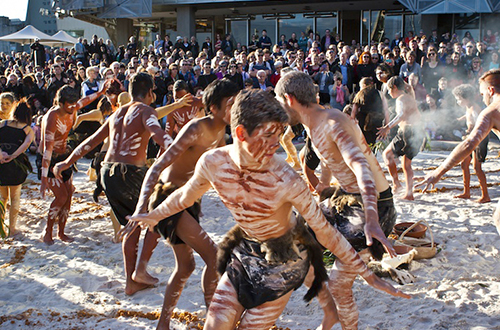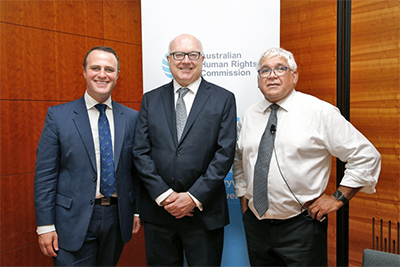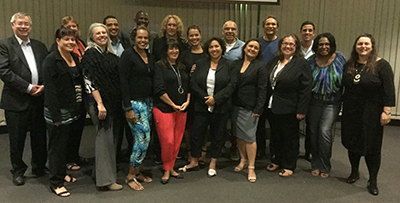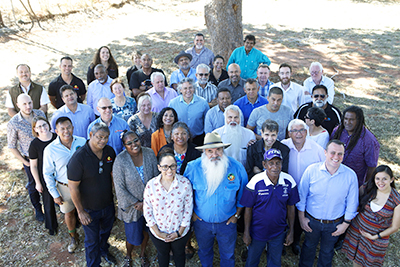 FIRST NATIONS artists and arts workers from Australia, New Zealand and Canada will come together to share knowledge and networks this month as part of the Australian Performing Arts Market (APAM) in Brisbane.
FIRST NATIONS artists and arts workers from Australia, New Zealand and Canada will come together to share knowledge and networks this month as part of the Australian Performing Arts Market (APAM) in Brisbane.
APAM 2016 will be held from February 22 to 26 and will feature 43 outstanding Australian and New Zealand companies presenting 28 exciting showcases, including full-length productions and excerpts, as well as 15 work in development pitches.
Aboriginal and Torres Strait Islander companies taking part in APAM 2016 include Western Australian dance company Marrugeku, Northern Territory dance group Djuki Mala, performing arts company Black Arm Band, and Melbourne’s ILBIJERRI Theatre Company.
Australia Council chief executive officer Tony Grybowski said the council would this year host two development programs for Aboriginal and Torres Strait Islander artists and arts workers alongside APAM 2016 – the inaugural First Nations arts exchange and a skills development 'boot camp' program.
Mr Grybowski said the two-day exchange would enable knowledge and ideas sharing between First Nations’ delegates working in all three countries and build strong connections, while the day-long boot camp "will equip artists and arts workers with limited experience of APAM with the tools they need to get the most out of the four-day market".
“The Australia Council established APAM in 1994 and it continues to be the only industry event in Australia to provide international and national presenters, agents and influencers with access to live works by Australian and New Zealand artists across genres and cultural backgrounds, including Aboriginal and Torres Strait Islander arts,” Mr Grybowski said.
“It is extremely important for our artists to make strategic international connections. APAM provides Australian artists and arts organisations a unique opportunity to perform live to an international and national industry audience, introduce the artistic creator and increase awareness for their company and body of work, with the ultimate aim of securing national and international tours.
“The First Nations exchange and boot camp are initiatives of the council’s Aboriginal and Torres Strait Islander arts strategy and builds on the success of other council-managed initiatives at other industry events, such as APAM 2014, Australian World Music Expo 2014, BIGSOUND 2015 and the 2015 Australian Performing Arts Centres Association conference.
“We are delighted that several state arts agencies, the Canada Council for the Arts and Creative New Zealand have partnered with us to support artists and producers from their region to attend the APAM boot camp and First Nations exchange," Mr Grybowski said.
“The aim of these programs is to help the First Nations arts community engage in and access markets, form partnerships and collaborations, and enable more national and international presenters, programmers, producers and buyers to see export-ready works and creators.
“The importance of this investment has been confirmed by recent international arts activity research that highlighted the key role played by Australia Council expertise, networks and introductions in connecting Australian artists and arts organisations with international markets.”
The inaugural First Nations exchange will bring together 18 First Nations artists and arts workers from Australia, Canada and New Zealand, while the boot camp will involve 17 participants.
The exchange is the second in a partnership between the Australia Council, Canada Council for the Arts and Creative New Zealand after a similar event was held for First Nations curators at the 8th Asia Pacific Triennial of Contemporary Art (APT8) at QAGOMA, Brisbane in November. This is the second time a boot camp has been held at APAM with support from state arts agencies.
APAM 2014 saw 19 Indigenous artists and arts workers participate in boot camp, including Melbourne Indigenous Arts Festival creative director and ILBIJERRI associate producer Jacob Boehme.
Mr Boehme said at first he found boot camp a struggle as he wasn’t familiar with the language used to promote an artists’ work.
“Most artists don’t know sector or industry speak, but once you get past that and realise there’s nothing to fear about that side of the business, it was really empowering,” Mr Boehme said.
“The boot camp gave us the tools to create a life beyond a premiere and advice on where my work would be a better fit – your livelihood depends on knowing that stuff.”
Mr Boehme said networking was also an important part of the boot camp and APAM experience.
“I made a number of connections and the boot camp gave me the confidence to do that and to view people as friends and colleagues,” Mr Boehme said.
Mr Boehme said Australia Council initiatives, such as the APAM boot camp, were important for artists.
“Knowledge is power and it leads to more informed choices and it gives you choice,” Mr Boehme said.
Mr Boehme advised this year’s participants to remember to breathe and relax during boot camp.
“Take everything in, and take on what your gut tells you to do, as you know what’s right for you.”
The Australian First Nations exchange participants are: Jacob Boehme, Kyle Morrison, Alison Murphy-Oates, Rachael Maza, Liza-Mare Syron, Lily Shearer, Diat Alferink, and Merindah Donnelly.
The boot camp participants are Ghenoa Gela, Ian RT Colless, Mariaa Randall, Nathan Maynard, Jermaine Beezley, Fred Leone, Getano Bann, Angela Flynn, Coby Edgar and Pauline Lampton.
http://www.australiacouncil.gov.au/strategies-and-frameworks/first-nations-exchange-and-boot-camp/
http://www.performingartsmarket.com.au
ends


 How to resolve AdBlock issue?
How to resolve AdBlock issue?  FIRST NATIONS artists and arts workers from Australia, New Zealand and Canada will come together to share knowledge and networks this month as part of the Australian Performing Arts Market (APAM) in Brisbane.
FIRST NATIONS artists and arts workers from Australia, New Zealand and Canada will come together to share knowledge and networks this month as part of the Australian Performing Arts Market (APAM) in Brisbane.



